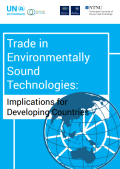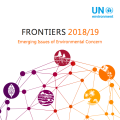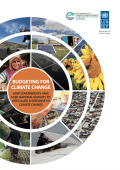This policy brief, Understanding Risks Related to the Decarbonisation of the European Steel Sector, produced by the TRANSrisk project focuses on understanding risks related to the implementation of different decarbonisation options, the relevance of these risks for innovation processes in the steel sector, and ways to reduce and manage them.

This report aims to enhance understanding of the implications, capacity needs and enabling conditions for trade liberalization of environmentally sound technologies (ESTs), with focus on developing countries. It focuses its analysis on five ESTs, namely solar photovoltaic cells (PVs), water filters, waste incinerators, gas filtering machinery, hemp and flax fibers.

Frontiers 2018/19: Emerging issues of environmental concern consolidates and analyzes the emerging issues that will have profound effects on our society, economy, and environment.

This document presents lessons learned from over twenty Climate Public Expenditure and Institutional Reviews, a key tool for country decision-makers to improve their understanding of how and how much they are spending on their national climate change responses, and to identify public programmes with climate change objectives or co-benefits in which governments are investing.
This report, 1.5-Degree Lifestyles: Targets and options for reducing lifestyle carbon footprints, analyses the carbon footprint of household lifestyles and how changes can contribute to meeting the ambitious 1.5-degree aspirational target envisaged by the Paris Agreement on climate change. It analyses scientific emission scenarios and case studies from Finland, Japan, China, Brazil, and India, and proposes long-term targets for individuals’ lifestyle carbon footprints by 2030-2050, as well as low-carbon options that citizens and society can adopt.
